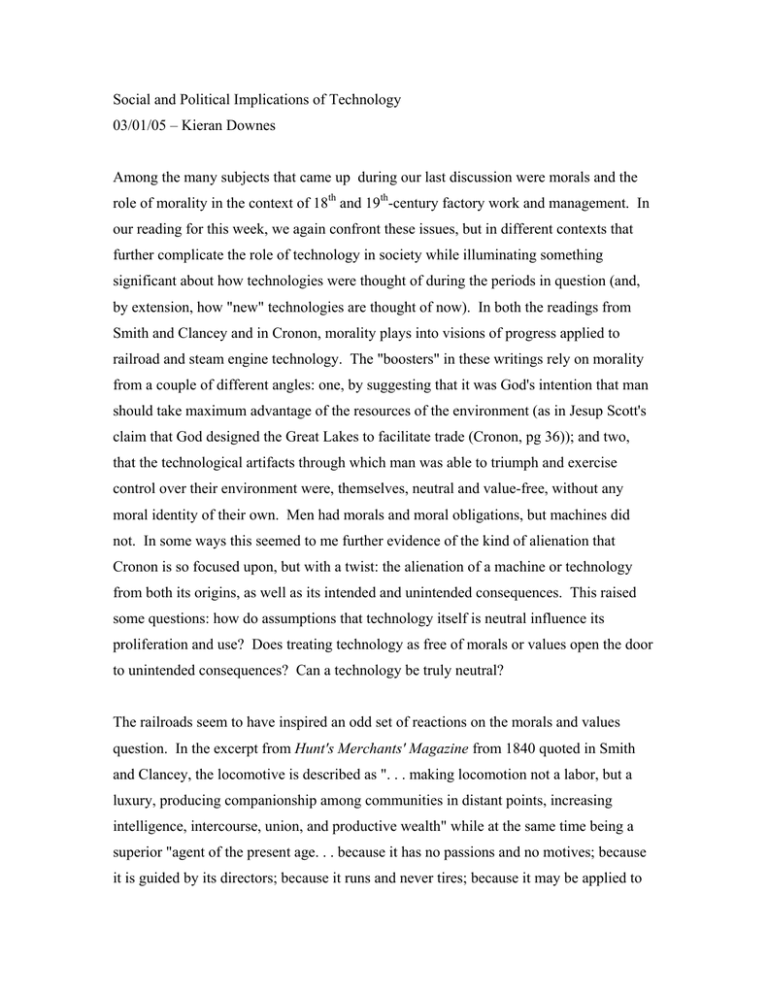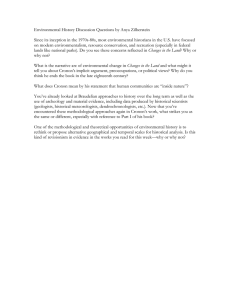03/01/05 – Kieran Downes
advertisement

Social and Political Implications of Technology 03/01/05 – Kieran Downes Among the many subjects that came up during our last discussion were morals and the role of morality in the context of 18th and 19th-century factory work and management. In our reading for this week, we again confront these issues, but in different contexts that further complicate the role of technology in society while illuminating something significant about how technologies were thought of during the periods in question (and, by extension, how "new" technologies are thought of now). In both the readings from Smith and Clancey and in Cronon, morality plays into visions of progress applied to railroad and steam engine technology. The "boosters" in these writings rely on morality from a couple of different angles: one, by suggesting that it was God's intention that man should take maximum advantage of the resources of the environment (as in Jesup Scott's claim that God designed the Great Lakes to facilitate trade (Cronon, pg 36)); and two, that the technological artifacts through which man was able to triumph and exercise control over their environment were, themselves, neutral and value-free, without any moral identity of their own. Men had morals and moral obligations, but machines did not. In some ways this seemed to me further evidence of the kind of alienation that Cronon is so focused upon, but with a twist: the alienation of a machine or technology from both its origins, as well as its intended and unintended consequences. This raised some questions: how do assumptions that technology itself is neutral influence its proliferation and use? Does treating technology as free of morals or values open the door to unintended consequences? Can a technology be truly neutral? The railroads seem to have inspired an odd set of reactions on the morals and values question. In the excerpt from Hunt's Merchants' Magazine from 1840 quoted in Smith and Clancey, the locomotive is described as ". . . making locomotion not a labor, but a luxury, producing companionship among communities in distant points, increasing intelligence, intercourse, union, and productive wealth" while at the same time being a superior "agent of the present age. . . because it has no passions and no motives; because it is guided by its directors; because it runs and never tires; because it may be applied to so many uses, and expanded to any strength." (pg. 193) What Cronon demonstrates so well is that as much the "boosters" may have treated this new technology as a neutral and generous artifact of humankind's ingenuity and God's good will, the railroad was anything but neutrally applied. Values and moral beliefs played a substantial role in the decisions made by Chicagoans and others regarding how the railroad – and the grain elevators and lumber mills – would be put to use in their communities and elsewhere. As Cronon's paraphrase of Scott seems to suggest, many of these activities were seen as a moral duty rather than merely economically and commercially sensible. Though described with a great deal more hyperbole than would be appropriate now, I was reminded by the passages above from Smith and Clancey of the ways in which people – marketers, pundits and others – talk about modern technologies such as the Internet and cell phones. We are constantly being reminded of how much a specific technology is going to make us better people in various ways, bring us closer together with our communities, families and so forth. Very infrequently to questions regarding the neutrality of these technologies or any questions of morals ever come up. Questions concerning health effects from cell phone usage have largely fallen by the wayside with the introduction of more carriers, expanded coverage and phones that can take pictures, record audio and do all sorts of other random things. Social constructivism teaches us that science and technology are never value-free, and yet we are very accepting of a variety of new technologies without ever considering what the values and moral positions inherent in those technologies might be. It is easy to look back upon the boosters of 19th century Chicago and think, "it's so ridiculous how they thought about technology X" and yet we are still doing it today, and still setting ourselves up for unforeseen complications. Or perhaps it isn't a question of morals anymore – I may be conflating morals and values in an inappropriate way. But moral views certainly seemed to have influenced decisions and choices in 19th-century Chicago. So what is different about now verses then? How does one frame a discussion of the "morals" of the Internet? What does Cronon offer by way of a discussion of morals and values regarding current technological trends and artifacts, and our decisions about how to use or apply them?






